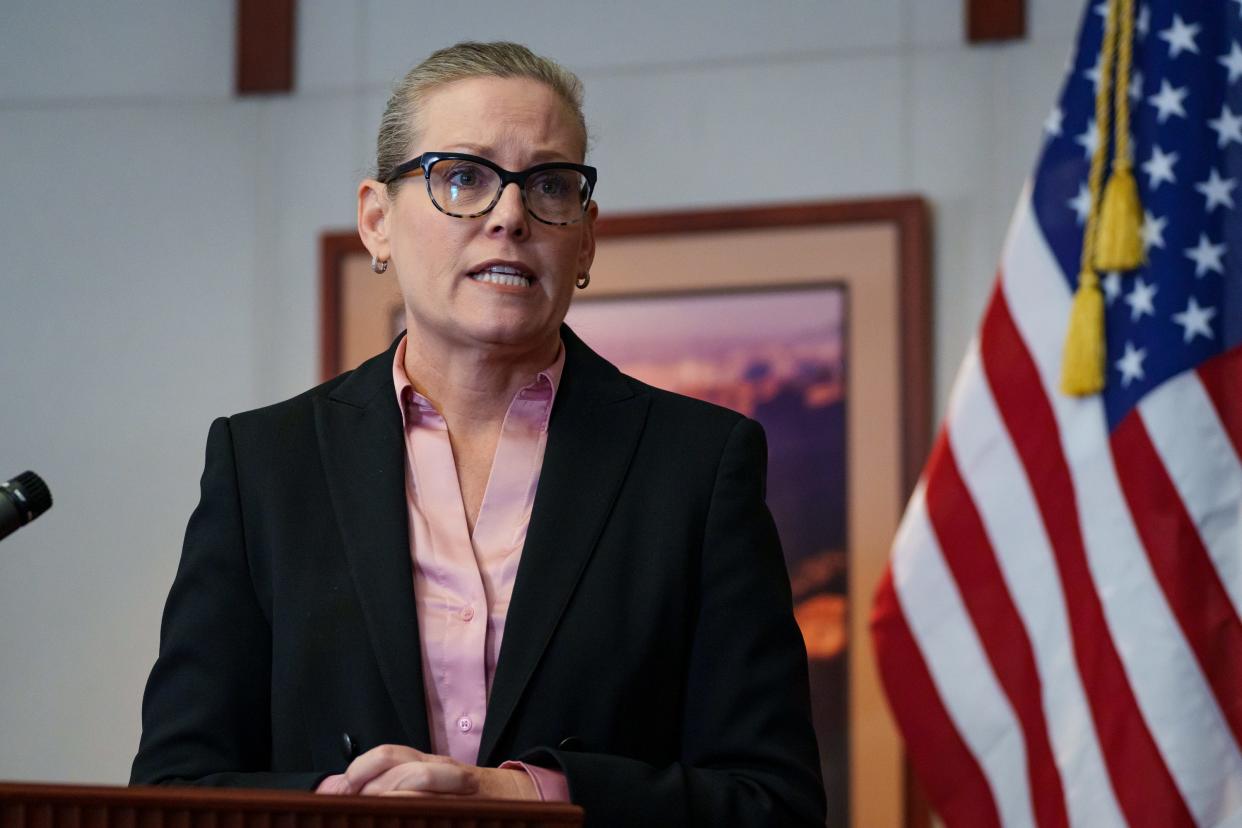Gov. Hobbs vetoes Wendy Rogers' bill banning speed cameras and GOP-sponsored election bills

- Oops!Something went wrong.Please try again later.
- Oops!Something went wrong.Please try again later.
Gov. Katie Hobbs vetoed several bills Friday, including one that would have banned municipalities or state agencies from using speed or red-light cameras.
"This bill's ban of photo radar would eliminate an important tool for law enforcement that allows for a more efficient allocation of limited police resources," Hobbs wrote in a veto letter about the bill, which was sponsored by Sen. Wendy Rogers, R-Flagstaff.
In a statement released moments after word of Hobbs' veto, Rogers — who did not return a message seeking comment — said that the camera-enforcement systems "do little" to prevent collisions or bad driving, collect millions of dollars from motorists and are an "egregious invasion of our privacy."
"Hobbs' veto fails Arizonans," Rogers wrote. "She will ultimately answer to our fleeced drivers who don’t support this years-long cash grab cloaked in the name of 'traffic enforcement.'"
For subscribers: Gov. Katie Hobbs sets Arizona record for rejecting proposals from Legislature
Rogers has tried unsuccessfully to get rid of photo radar for the past three years.
Several Arizona cities or towns, including Scottsdale and Paradise Valley, use the devices, sending notices to violators that include photos of a vehicle's license plate and whoever is behind the wheel.
Scottsdale urged Hobbs to veto the bill, saying in a letter signed by the city's mayor and council that photo enforcement allows police officers to address other problems, such as violent crimes. The letter cited an engineering firm claiming that the system reduces accidents.
"Removing this valuable tool grants license to reckless behavior," which endangers others, the Scottsdale letter states.
Hobbs also rejected four election-related bills sponsored by Republicans, writing veto letters for each. The bills would have:
Banned people from paying or receiving anything in value based on voter registrations "collected, completed or submitted." The bill passed the Senate on party lines, but four Democrats voted for it in the House. Hobbs wrote that she looks forward to working with the sponsor and supporters for "real solutions to the challenges facing our elections."
Banned the state and municipalities from being a member of a multistate "voter registration list maintenance organization." This bill would have prevented the state from working with the Election Registration Information Center (ERIC), Hobbs wrote, calling it an "essential tool for ensuring accurate registration rolls in Arizona" and elsewhere.
Required county recorders to provide a way for voters to have their early ballots counted at a polling place or voting center. The bill would have been "very difficult for election officials to implement," Hobbs wrote.
Required any nongovernment organization that mails an election-related document, or one that "resembles an official election-related document," to include a disclosure on its envelope stating it was not from a government agency. Mandating the text size of the disclosure would have created an "unreasonable burden" for elections officials, she wrote.
Sen. John Kavanagh, R-Fountain Hills, who sponsored two of the bills, said he was disappointed in the governor's actions.
"I still stand on the side of transparency, and I'm sorry the governor wasn't with me," he said about his attempt to require nongovernment entities to publish disclosures on mailed election information.
On his bill that would have banned participation in multistate voter registration programs, Kavanagh said he believes ERIC was leaking information that was "being used for partisan and political electioneering," though he acknowledged that he couldn't confirm that claim.
Hobbs signed two bills that passed with strong bipartisan support.
Eliminating court-ordered fees for juveniles, except for victim-restitution fees and for certain driving-under-the-influence offenses.
Changing the time period that gives cities and counties the discretion to allow or not to allow fireworks use around Christmas. Currently, cities don't have the ability to ban fireworks on Dec. 24 or 25, but they could ban fireworks on those dates when the bill takes effect. The new law also extends the date that cities cannot ban fireworks to Jan. 4 from Jan. 3.
The first was sponsored by Sen. David Gowan, R-Sierra Vista. "These kids are trying to get their lives back on track," Gowan said of his bill. "Why punish them and their families with what's essentially a regressive tax on a vulnerable population?"
The second was sponsored by Sen. J.D. Mesnard, R-Chandler. Mesnard said he was "really glad" his bill passed, adding that he has a young child who was startled on Christmas Eve by loud fireworks in his neighborhood. The bill still requires cities to take action in banning fireworks on Dec. 24 or 25, however.
As far as Chandler goes, "I hope they do," Mesnard said.
The bills signed will take effect 90 days after sine die, the date the Legislature ends its current session. That date has yet to be fixed by legislative leaders.
Reach the reporter at rstern@arizonarepublic.com or 480-276-3237. Follow him on Twitter @raystern.
This article originally appeared on Arizona Republic: Gov. Katie Hobbs vetoes bill banning speed cameras in Arizona

